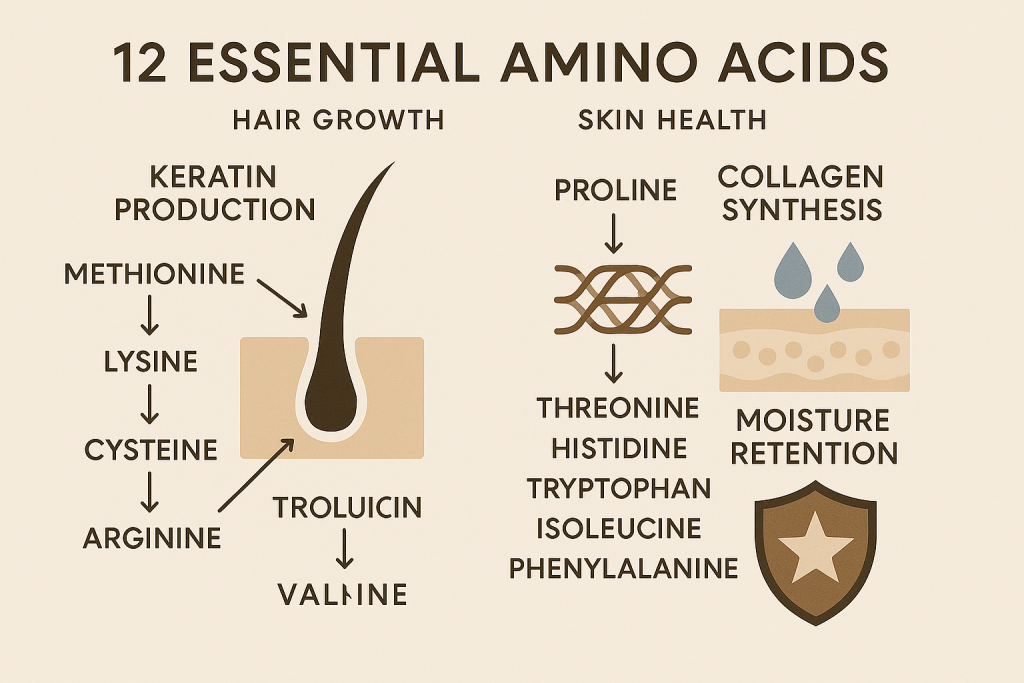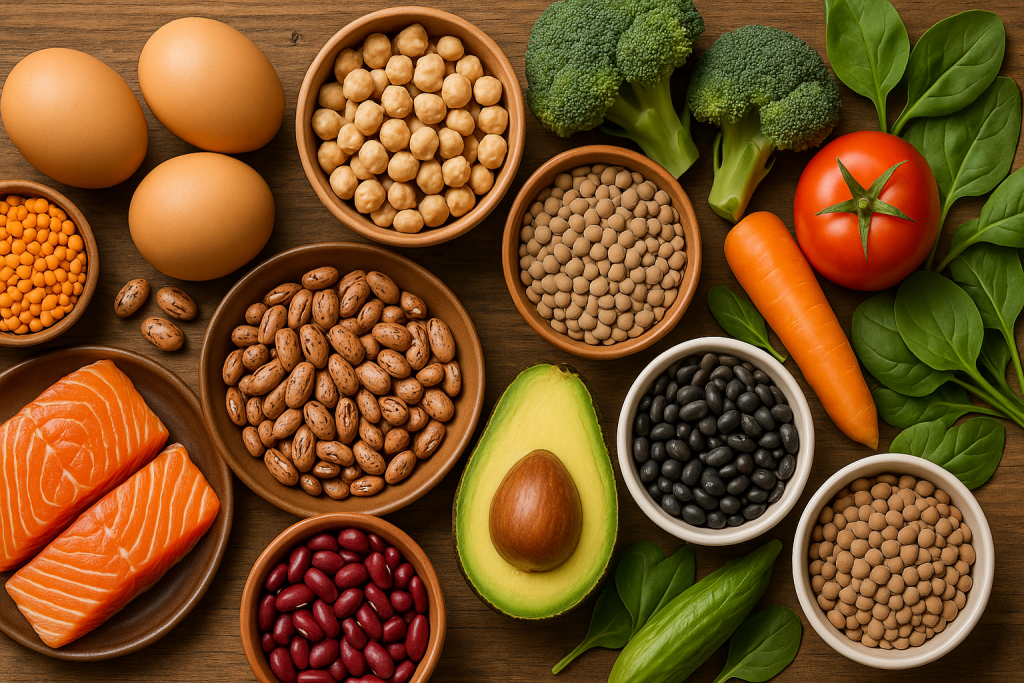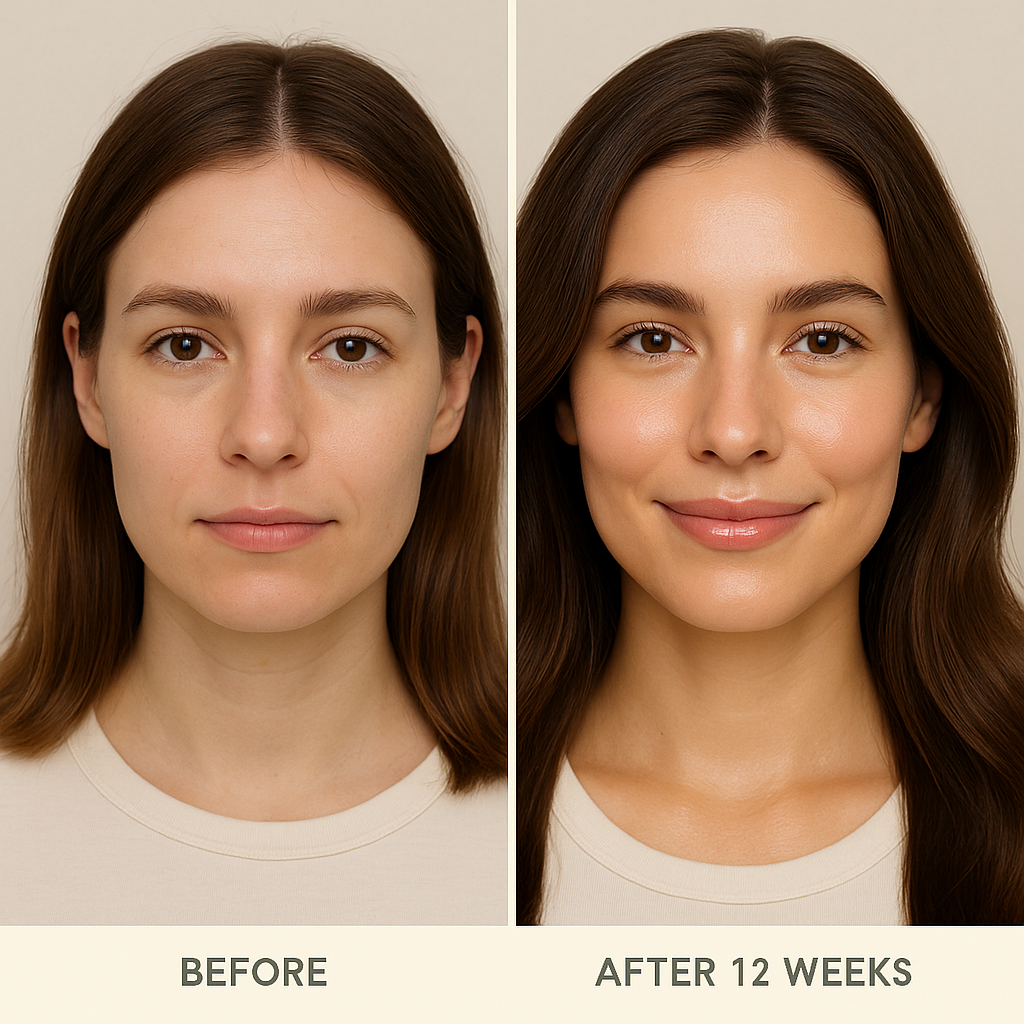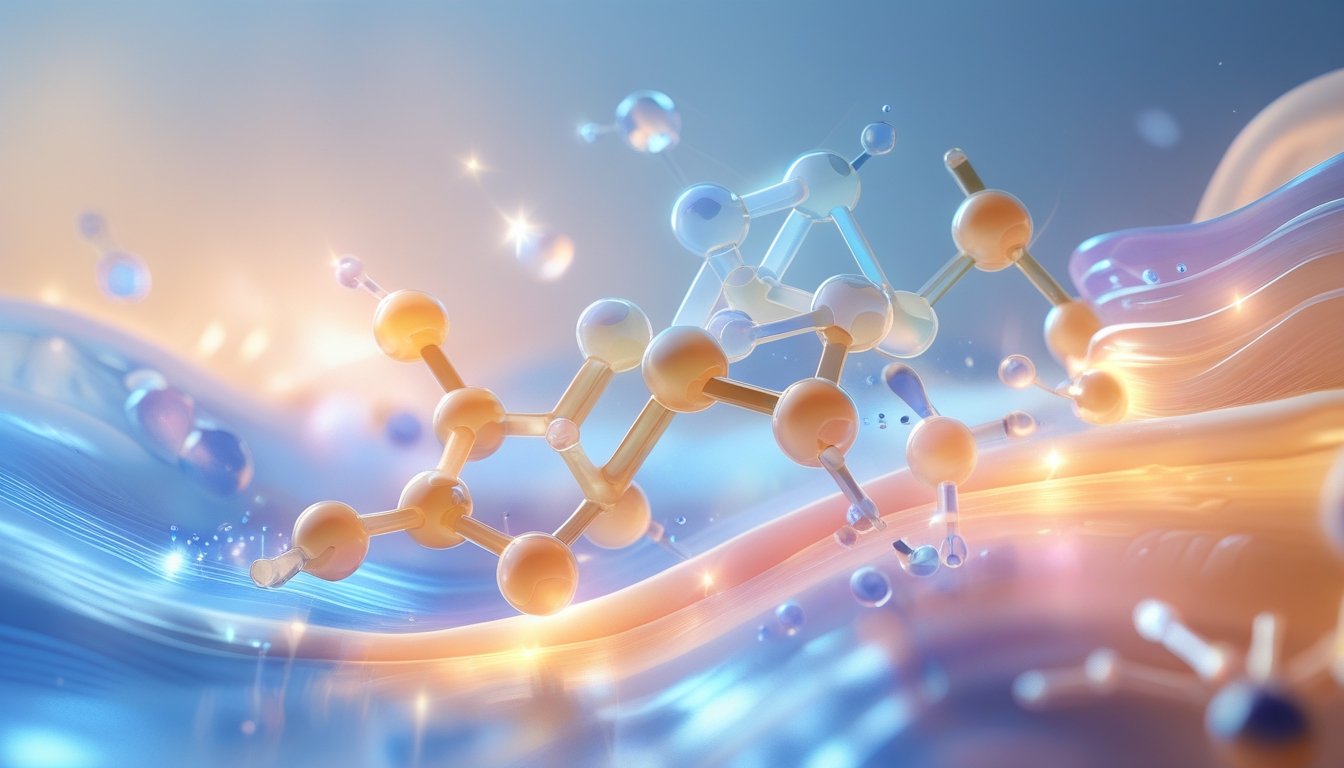Amino acids for hair growth and skin health represent the foundation of natural beauty enhancement, serving as the fundamental building blocks that transform your appearance from within.
These powerful molecules work tirelessly to strengthen hair follicles, boost collagen production, and maintain the structural integrity of both your hair and skin12.
Understanding how specific amino acids contribute to beauty can revolutionize your approach to achieving healthier, more vibrant hair and glowing skin naturally.
Hair is primarily composed of keratin, a protein made up of various amino acids that determine its strength, elasticity, and overall health17. Similarly, skin relies heavily on collagen and elastin proteins, which are constructed from specific amino acid combinations that maintain firmness, hydration, and youthful appearance29.
When your body lacks adequate amino acids, both hair and skin suffer, leading to brittle strands, premature aging, and compromised barrier function.
Understanding Amino Acids and Their Beauty Benefits
Essential vs. Non-Essential Amino Acids
The human body requires twenty different amino acids to function optimally, categorized into essential, non-essential, and conditionally essential groups212. Essential amino acids including histidine, isoleucine, leucine, lysine, methionine, phenylalanine, threonine, tryptophan, and valine must be obtained through diet or supplements since the body cannot produce them independently12.
Non-essential amino acids such as alanine, arginine, asparagine, aspartic acid, cysteine, glutamic acid, glutamine, glycine, proline, serine, and tyrosine can be synthesized by the body but still benefit from external supplementation112. These amino acids work synergistically to support protein synthesis, cellular repair, and the production of essential beauty proteins.
How Amino Acids Transform Hair and Skin
Amino acids contribute to beauty through multiple mechanisms. They strengthen the skin's natural moisture barrier, boost hydration by working with aquaporins, and help regulate pH balance in the stratum corneum29. For hair, amino acids form disulfide bonds that provide strength and structure while supporting moisture retention and preventing breakage114.
Research demonstrates that amino acids accelerate wound healing, stimulate collagen production, and support immune responses needed for tissue repair217. They also protect against UV damage through aromatic amino acids like tryptophan, tyrosine, and phenylalanine, which absorb harmful light and prevent collagen breakdown2.
The Top 12 Amino Acids for Hair Growth and Skin Health
Cysteine – The Hair Superhero
Cysteine stands out as the most crucial amino acid for hair health, earning its reputation as the “hair superhero”13. This sulfur-containing amino acid forms disulfide bonds that give hair its strength, elasticity, and resistance to breakage17. Cysteine also helps transport essential minerals like iron and zinc to hair follicles, supporting optimal growth conditions1.
For skin health, cysteine contributes to keratin formation in the outer skin layers and supports the production of glutathione, a powerful antioxidant that protects against free radical damage314. Regular cysteine intake through foods like broccoli, chicken, wheat germ, and sprouts can significantly improve both hair texture and skin resilience3.
Methionine – The Growth Catalyst
Methionine serves as a double-threat amino acid, preventing hair loss while protecting against breakage and free radical damage13. As an essential amino acid rich in sulfur, methionine is vital for keratin synthesis in hair shafts and supports collagen production throughout the body38.
This amino acid also neutralizes free radicals, reduces inflammation, and improves skin tone and elasticity2. Methionine deficiency can lead to weakened hair structure and compromised skin barrier function, making adequate intake essential for maintaining beauty from within13.
Lysine – The Collagen Builder
Lysine plays a critical role in collagen formation, making it essential for both hair growth and skin elasticity13. Studies have linked lysine deficiencies to hair loss, highlighting its importance in maintaining healthy follicle function18. This amino acid also boosts iron absorption, another crucial factor for preventing hair shedding and supporting growth16.
For skin benefits, lysine preserves the moisture barrier, maintains firmness, and supports the structural integrity of connective tissues23. Foods rich in lysine include eggs, meat, fish, legumes, and dairy products, making it accessible through various dietary sources38.
Arginine – The Circulation Enhancer
Arginine stimulates hair follicles by improving blood circulation to the scalp, ensuring optimal nutrient delivery for growth17. This amino acid also supports collagen production and may protect hair from hydrogen peroxide damage, which can weaken and dull strands118.
In skincare, arginine repairs damage, promotes wound healing, and provides deep hydration217. Its ability to enhance blood flow benefits both scalp health and skin cell regeneration, making it a versatile beauty-supporting amino acid17.
Proline – The Structure Supporter
Proline is essential for collagen formation, playing a critical role in hair shaft structure and skin firmness12. This amino acid strengthens the surface, promotes tissue repair, and stimulates both collagen and elastin production217. While the body can produce some proline, dietary intake from protein-rich foods supports optimal levels118.
For hair health, proline helps create protective structures that shield against environmental damage718. In skin, it contributes to wound healing, cellular regeneration, and maintaining the structural integrity of connective tissues217.
Glycine – The Stress Reducer
Glycine helps reduce stress hormones that contribute to hair loss while supporting overall hair health through keratin production12. This amino acid increases collagen synthesis, accelerates healing, and maintains skin firmness29. As a component of natural moisturizing factors, glycine helps the stratum corneum retain moisture effectively9.
Research shows that glycine promotes glutathione's antioxidant effects, providing enhanced cellular protection for both hair follicles and skin cells215. Its calming properties on stress hormones make it particularly valuable for stress-related hair loss prevention1.
Tyrosine – The Pigmentation Protector
Tyrosine is crucial for melanin production, which determines hair color and protects against UV damage12. Low tyrosine levels have been linked to stress-induced hair loss, making adequate intake important for maintaining both color and growth17. This aromatic amino acid also absorbs UV light, providing natural protection against sun damage2.
In skin health, tyrosine supports pigmentation processes and helps maintain even skin tone7. Its UV-absorbing properties contribute to photoprotection, though additional sunscreen remains necessary for comprehensive protection2.
Serine – The Moisture Master
Serine excels at water-binding, helping maintain hair's natural moisture balance and elasticity1415. This amino acid is a key component of natural moisturizing factors in skin, where it penetrates deep into the stratum corneum to deliver effective hydration915.
For hair care, serine prevents dryness and frizz while improving manageability1415. In skincare, it strengthens the moisture barrier and supports the skin's ability to retain water, resulting in plumper, more hydrated skin915.
Threonine – The Tissue Repairer
Threonine plays a key role in producing skin and connective tissue while supporting immune function1318. This essential amino acid assists with protein synthesis, collagen formation, and wound healing processes18. For hair health, threonine contributes to the structural proteins that maintain strand integrity18.
Good sources of threonine include fish, shellfish, dairy products, and meat, making it accessible through various protein-rich foods18. Its role in tissue repair makes it valuable for recovering from hair damage and skin injuries1318.
Histidine – The Calming Agent
Histidine calms irritation, protects against environmental stress, and stimulates collagen synthesis212. This essential amino acid is crucial for creating histamine, a neurotransmitter that helps maintain sleep-wake cycles and supports various physiological functions13.
For skin health, histidine provides anti-inflammatory benefits and supports barrier function212. In hair care, it contributes to follicle health and helps protect against environmental damage that can weaken strands2.
Leucine – The Regeneration Promoter
Leucine promotes cellular regeneration, helping minimize fine lines, creases, and wrinkles218. This branched-chain amino acid is vital for protein synthesis and assists in energy production, making it crucial for hair growth processes18. Leucine also helps regulate growth hormone production, supporting overall tissue development13.
In beauty applications, leucine's regenerative properties benefit both hair follicle renewal and skin cell turnover218. Its role in protein synthesis makes it essential for maintaining the structural proteins that keep hair and skin healthy18.
Valine – The Energy Provider
Valine supports protein synthesis and provides energy for cellular processes involved in hair growth and skin repair18. As a branched-chain amino acid, valine assists in muscle growth and repair while supporting immune function18. This essential amino acid must be obtained through diet from sources like eggs, legumes, dairy, fish, and meat18.
For beauty benefits, valine's role in protein synthesis directly supports keratin and collagen production18. Its energy-providing properties help fuel the metabolic processes necessary for healthy hair growth and skin regeneration18.

Dietary Sources and Supplementation Strategies
Animal-Based Protein Sources
Complete proteins from animal sources provide all essential amino acids in optimal ratios for beauty benefits28. Dairy products, whole eggs, poultry, beef, pork, lamb, organ meats, bone broth, and seafood offer comprehensive amino acid profiles that support both hair and skin health28.
Fish and shellfish are particularly rich in threonine, while meat products provide excellent sources of methionine, cysteine, and lysine818. Dairy products offer balanced amino acid profiles along with additional nutrients that support collagen synthesis28.
Plant-Based Protein Combinations
Vegetarians and vegans can obtain complete amino acid profiles by combining different plant proteins throughout the day28. Effective combinations include rice and black beans, corn and lentils, pasta and peas, chickpea hummus with wheat pita bread, and whole-wheat bread with peanut butter2.
Complete plant proteins like quinoa, tofu, tempeh, edamame, and soy milk contain all nine essential amino acids28. Soybeans, chia seeds, hemp seeds, buckwheat, amaranth, and spirulina also provide comprehensive amino acid profiles for plant-based beauty support2.
Supplementation Considerations
While whole foods remain the preferred source of amino acids, targeted supplementation can address specific deficiencies or support enhanced beauty goals28. Collagen peptides, protein powders, essential amino acid blends, and individual amino acid supplements offer concentrated support for hair and skin health2.
Research suggests that synthetic amino acids may hydrate skin even more efficiently than food-derived versions, making topical applications valuable additions to internal supplementation2. However, consulting healthcare professionals before beginning supplementation ensures safe and effective protocols818.

Topical Applications and Beauty Products
Amino Acid-Infused Skincare
Modern skincare formulations increasingly incorporate amino acids for their proven hydrating and anti-aging benefits29. Products containing hydroxyproline, proline, lysine, and glycine work synergistically with antioxidants like vitamin C, glutathione, and ferulic acid to strengthen skin barriers and brighten complexions2.
Amino acid serums penetrate deep into the stratum corneum, delivering targeted hydration and supporting natural moisturizing factors917. These formulations help neutralize free radicals, stimulate collagen turnover, and promote skin cell renewal for visible anti-aging results217.
Hair Care Applications
Shampoos, conditioners, and treatments containing specific amino acids help promote moisture retention and prevent breakage914. Silk amino acids like serine and glycine have low molecular weights that allow deep penetration into hair shafts, forming protective barriers that reduce dryness and enhance shine15.
Keratin treatments often contain amino acids that mimic natural hair proteins, repairing structural damage by filling weak areas along the cuticle15. These treatments significantly reduce split ends, improve manageability, and restore glossy appearances to over-processed or environmentally damaged hair15.
Professional Treatment Options
Professional treatments combining multiple amino acids offer intensive repair and regeneration benefits1517. Salon treatments may include concentrated amino acid masks, deep conditioning systems, and specialized scalp treatments that deliver targeted nutrition directly to hair follicles15.
Advanced skincare treatments incorporating amino acid complexes can address specific concerns like fine lines, uneven texture, and compromised barrier function17. These professional applications often combine amino acids with other active ingredients for enhanced efficacy217.
Maximizing Absorption and Effectiveness
Timing and Combination Strategies
Optimal amino acid absorption occurs when proteins are consumed throughout the day rather than in single large doses28. Combining amino acids with vitamin C enhances collagen synthesis, while pairing them with iron-rich foods supports better mineral absorption for hair health18.
Taking amino acid supplements on an empty stomach may improve absorption, though some individuals tolerate them better with food8. Spreading intake across meals ensures steady availability for ongoing protein synthesis and repair processes28.
Lifestyle Factors That Enhance Benefits
Adequate hydration supports amino acid transport and utilization throughout the body29. Regular exercise improves circulation, enhancing delivery of amino acids to hair follicles and skin cells17. Quality sleep allows optimal protein synthesis and cellular repair processes to occur2.
Stress management is crucial since chronic stress depletes amino acids and interferes with their beauty-supporting functions12. Practices like meditation, yoga, and adequate rest help maintain optimal amino acid utilization for hair and skin health1.
Avoiding Interference Factors
Excessive alcohol consumption can interfere with amino acid absorption and utilization8. High sugar intake may compete with amino acid transport mechanisms, reducing their effectiveness2. Smoking depletes antioxidant amino acids and impairs circulation to hair follicles and skin12.
Certain medications may affect amino acid metabolism, making professional guidance important when combining supplementation with medical treatments8. Processing and cooking methods can also impact amino acid availability from food sources28.

Scientific Evidence and Research Findings
Clinical Studies on Hair Growth
Recent research demonstrates that amino acid supplements containing taurine, cysteine, methionine, and other nutrients can boost the effects of clinical hair loss treatments13. Studies show that arginine and glutamine supplements accelerate wound healing and promote tissue repair, contributing to overall scalp health2.
Research on lysine deficiency reveals direct connections to hair loss and reduced hair volume, emphasizing the importance of adequate intake for maintaining healthy growth patterns18. Clinical trials examining cysteine supplementation show significant improvements in hair strength and resistance to breakage13.
Skin Health Research
Studies on amino acid applications to skin demonstrate enhanced moisture retention and improved barrier function29. Research comparing synthetic amino acids to food-derived versions shows superior hydration capabilities in topical applications2.
Clinical investigations into collagen-supporting amino acids reveal measurable improvements in skin elasticity, firmness, and wrinkle reduction217. Studies on UV protection show that aromatic amino acids provide meaningful photoprotective benefits when combined with traditional sunscreen approaches2.
Long-term Safety and Efficacy
Long-term studies on amino acid supplementation show excellent safety profiles when used appropriately28. Research indicates that consistent amino acid support provides cumulative benefits for both hair and skin health over time115.
Clinical data suggests that combining internal supplementation with topical applications offers superior results compared to single-approach strategies29. Studies on various populations demonstrate that amino acid benefits extend across different age groups and skin types217.
Frequently Asked Questions
1. How long does it take to see results from amino acid supplementation for hair and skin?
Most people notice initial improvements in skin hydration within 2-4 weeks, while hair changes typically become visible after 6-12 weeks of consistent amino acid support12. Hair growth cycles require longer timeframes for significant changes to become apparent.
2. Can I get enough amino acids from diet alone, or do I need supplements?
A well-balanced diet including complete proteins can provide adequate amino acids for most people28. However, those with specific deficiencies, dietary restrictions, or enhanced beauty goals may benefit from targeted supplementation under professional guidance.
3. Are there any side effects from taking amino acid supplements?
Amino acid supplements are generally well-tolerated when used appropriately28. Some individuals may experience mild digestive upset when starting supplementation, which typically resolves with continued use or dosage adjustments.
4. Which amino acids are most important for preventing hair loss?
Cysteine, methionine, lysine, and arginine are particularly crucial for preventing hair loss13. These amino acids support hair structure, improve circulation, and provide the building blocks necessary for strong, healthy growth.
5. Can amino acids help with premature graying?
Tyrosine supports melanin production, which determines hair color17. While amino acids may help maintain natural pigmentation, genetic factors primarily control graying patterns, and results vary among individuals.
6. Do topical amino acid products work better than oral supplements?
Both approaches offer unique benefits, with topical applications providing direct delivery to skin and hair, while oral supplements support systemic protein synthesis29. Combining both methods often produces optimal results.
7. Are amino acids safe during pregnancy and breastfeeding?
While amino acids from food sources are generally safe, pregnant and breastfeeding women should consult healthcare providers before using supplements8. Professional guidance ensures appropriate dosing and safety for both mother and baby.
8. Can amino acids interfere with medications?
Some amino acids may interact with certain medications, particularly those affecting neurotransmitter function8. Always consult healthcare providers before combining amino acid supplements with prescription medications.
9. How do I know if I'm deficient in specific amino acids?
Signs of amino acid deficiency include brittle hair, slow wound healing, dry skin, and fatigue12. Blood tests can measure amino acid levels, though comprehensive evaluation by healthcare professionals provides the most accurate assessment.
10. Are plant-based amino acids as effective as animal-derived ones?
Plant-based amino acids can be equally effective when consumed in appropriate combinations to ensure complete protein profiles28. The key is obtaining all essential amino acids through varied plant protein sources throughout the day.
Transform Your Beauty Routine with Amino Acid Power
Amino acids for hair growth and skin health offer a scientifically-backed approach to enhancing your natural beauty from within. By understanding how these fundamental building blocks support keratin and collagen production, you can make informed decisions about nutrition, supplementation, and topical treatments that deliver visible results.
The twelve amino acids highlighted in this guide work synergistically to strengthen hair, improve skin texture, and support the cellular processes that maintain youthful vitality.
Whether through dietary optimization, targeted supplementation, or professional treatments, incorporating amino acids into your beauty routine provides the foundation for lasting improvements in both hair and skin health.

